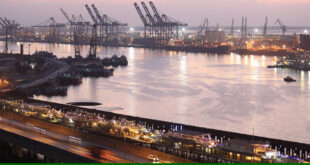Pakistan economy has suffered on various accounts such as war on terror, law and order and even US sanctions on Iran which is a major impediment between bilateral trade between two natural allies in the region.
As a result of US sanctions, the business communities of the two countries are forced to indulge in illegal cross border trade, which is estimated to the tune exceeding to $4 billion, while the energy shortage is also a handicap for Pakistan economy to catch up the other economies. It is because of US sanctions that the much sought after project of Iran-Pakistan Gas Pipeline project hanging in balance of years. It is strongly believed that as soon as the US sanctions on Iran are removed, the Iran-Pakistan gas pipeline project would be completed within the shortest possible time as Pakistan is rightfully deserve to have an excess to affordable energy through this pipeline project.
Iran gas pipeline
Pakistani Minister for Petroleum and Natural Resources, Khaqan Abbasi has said that Iran gas pipeline project remains the best option for Pakistan.
Mr. Abbasi and Energy Minister Khawaja Mohammed Asif inaugurated a two-day seminar in Washington, highlighting business opportunities in the clean energy sector in Pakistan. “We are running against time to meet energy deficit. We want energy sources that are both renewable and affordable,” Mr. Asif said in the conference. As long as US sanctions are there, we cannot buy gas from Iran.” The minister noted that relations between the United States and Iran were improving rapidly after the two signed a nuclear deal earlier this year. “This is good news for us. We hope that sanctions will be removed soon,” he said.
Pakistan enjoys a unique position
The Chairman of Pakistan Business Council (PBC), Bashir Ali Mohammad has said that Pakistan today is in a unique position to catch up and then overtake other economies in South Asia.
In his inaugural address at the third Pakistan Economic Forum, Bashir Ali Mohammad stated that for this to happen it was important to bring about major structural changes in the economy.
He appreciated that no one political party or stakeholder could alone push through the critical reforms needed. For achieving this consensus it was therefore imperative that a common National Economic Agenda (NEA) be developed and agreed to by all major political parties. He reminded the audience that the PBC since 2011 had been working on trying to build this national consensus and that the PEF event and the recommendations made by the panels are a part of this consensus building effort.
The third edition of the Pakistan Economic Forum (PEF) was held at the Habib University Campus in Karachi. The PEF Event which was sponsored by the Pakistan Business Council (PBC) brought together sector experts in the areas of “Energy”, “Logistics & Connectivity”, “Water” and “Macroeconomic Stability & Growth”. The sector experts formed in panels presented their recommendations on how to resolve, in the near and long-term, the issues which are viewed as critical for Pakistan.
The CEO of the Pakistan Business Council, Mr. Kamran Y. Mirza welcomed the participants and briefly discussed the objectives of the PBC, its membership, its achievements and its current areas of advocacy. He informed the gathering that the PBC members contributed 23 percent of Pakistan’s exports, 16 percent of all taxes collected in Pakistan and their combined revenues were 10 percent of the country’s GDP.
The Energy Panel chaired by Mr. Farooq Rehmatullah former Chairman OGDCL and Shell Pakistan and co-chaired by Mr. Khalid Mansoor, CEO of Hubco recommended that in order to have a focused strategy for resolving the energy crisis in country, it was important to have a single energy ministry. Further the panel called for the development of indigenous energy resources coupled with a national program aimed at improving energy efficiencies.
For the gas sector, the panel recommended that allocation of gas be prioritized with the power and industrial sectors getting first priority. Finally the panel recommended that the DISCOS be privatized and the multiple-seller model be adopted.
The Logistics and Connectivity Panel, chaired by Syed Salim Raza (former Governor State Bank of Pakistan), and co-chaired by Mr. Babar Badat a leading logistics practitioner recommended that the railway was the key to improving Pakistan’s competitiveness. The panel recommended that emphasis be on freight as opposed to passenger traffic to maximize the utilization of existing assets of the railways. The panel also called on the government to encourage the private sector under the “open access policy” to invest in rolling stock to run on the existing infrastructure of the Pakistan Railways.
Finally the panel recommended that the Railways be converted into a corporation and not be responsible for non-core operations.
The panel on water, chaired by Mr. Suleman Khan, called for a fresh commitment to Pakistan’s water resources and a proactive approach to the Indus Basin Water Treaty. The panel emphasized that a national consensus was imperative towards the need for and the construction of more mega water reservoirs in the country. Finally the panel recommended for revival of Water and Power Development Authority (WAPDA) as the vision envisaged for WAPDA in its founding document in 1958 is still relevant.
The macroeconomic panel, chaired by Dr. Ishrat Husain (former Governor State Bank of Pakistan and currently Dean & Director IBA) and co-chaired by Mr. Atif Aslam Bajwa (President & CEO Bank Alfalah), recommended major reforms in tax policy and tax administration. The panel recommended that the next NFC Award provide some sort of incentive for provinces to increase their tax collection. The panel which also had Mr. Shaukat Tarin former Federal Finance recommended major reforms in the Public Sector Enterprises and the financial sector. The panel recommended the creation of an Infrastructure Finance Bank to fund the CPEC projects and a revival of the Iran-Pakistan Pipeline plan.
Concluding the event, the Vice Chairman of the PBC, Mr. Atif Aslam Bajwa, thanked panelists and the participants and reminded them that the day’s event was part of a larger agenda. He informed the meeting that the next event would be held in Islamabad where the political parties would be invited and the National Economic Agenda (NEA) formally presented to them. Pakistan he said had no option other than to strive for and work on the implementation of common NEA.
The Pakistan Business Council is a private sector funded, not-for-profit company registered under the Companies Ordinance 1984. The PBC was formed in 2005 by 14 (now 47) of Pakistan’s largest business groups including multinationals. PBC members contribute 23 percent of Pakistan’s exports, 16.2 percent of Pakistan’s tax collection and their revenue is 10 percent of Pakistan’s GDP.
 PAGE Blog Business Weekly Magazine
PAGE Blog Business Weekly Magazine

